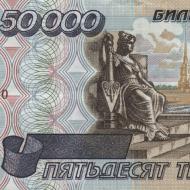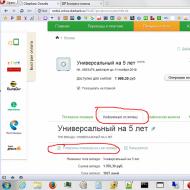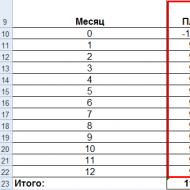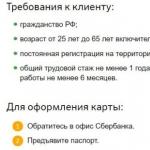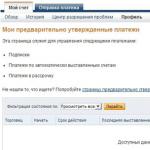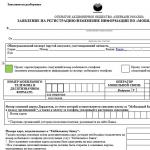
Who runs the central bank of Russia
Bank for International Settlements in Basel. Photo: Fabrice Coffrini / AFP / East news
Increasingly, there are reports of the Bank for International Settlements, which is considered by many to be the world's premier bank.
“The most exclusive club in the world has 18 members. They meet every month on Sunday evenings at 7 o'clock in the E conference room in a round tower building with tinted windows overlooking Basel's central railway station, writes English writer and journalist Adam Lebor. - Their discussion lasts for an hour, perhaps an hour and a half. The meeting ends, the assistants leave, and the rest stay for dinner in the dining room on the 18th floor, reasonably confident that the food and wine will be excellent. It is at dinner, which lasts until 11 pm, that the real work happens. ” And this work consists in the fact that decisions are made there on what will happen to world finances next month, and moreover, what will happen to them in general.
It is quite difficult to become a member of this unique club. It is necessary that the president or prime minister, in agreement with his finance minister and the leading bankers of the advanced economy, submit your candidacy to parliament, which should give you membership in this Basel club. Namely, you must be approved by the chairman of the central bank of the state. This club has a rather modest name - the Bank for International Settlements, or BIS. It consists exclusively of the heads of the central banks of developed economies. Often, chief bankers from other countries are invited to its meetings, but they are forced to either sit silently at meetings or crowd around at dinners, coffee breaks and random briefings, catching information in the corridors and almost in the toilets. As compensation, one of the leaders of the club - formal or informal, and there are some - will explain to you what's what, in one of the offices. It seems that Russia was allowed to the upper floors only in 1996, but only one person in the country can know for sure - Elvira Sapkhizadovna Nabiullina.
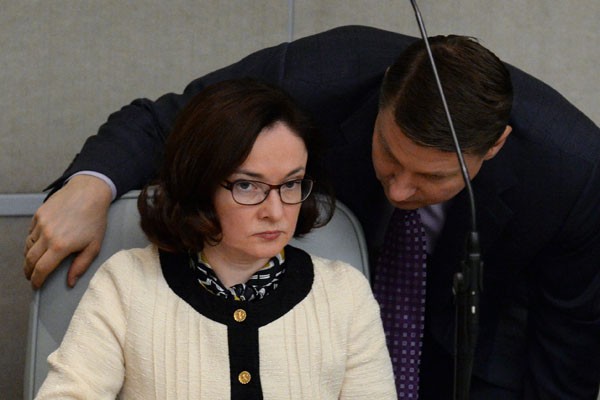
Chairman of the Central Bank of the Russian Federation Elvira Nabiullina. Photo: Sergey Kuznetsov / RIA Novosti
“As for the structure of relations between the Central Bank of Russia and the BIS, little is known about them. The structure is secret - shares secrets head of the Russian Economic Society Valentin Katasonov.- And, as far as it is known from unofficial sources, at least once a month the chairman of the Central Bank attends meetings there. I don’t know which deputy chairman is in charge of this area, but someone is in charge. I must say that Russia is actively using the BIS, probably, part of our gold and foreign exchange reserves is located on deposits. It is very likely that we have some kind of gold ties there, since the BIS is very active in gold trading and there is gold on the balance sheet of the BIS. The structure is closed.
Discussions, some central bankers say, should be confidential. “When you are in such an important position, at times you can feel quite lonely. It is useful to be able to meet with other leaders and say: "Here is my problem, what do you do in such cases?" - recalls sir Mervyn King, former governor of the Bank of England. “Having the opportunity to talk informally and openly about our experiences is incredibly valuable. We do not speak in a public forum. We can say what we really think and assume, and we can ask questions and get feedback from others.”
The management of the BIS is trying to provide a friendly atmosphere throughout the weekend, and it seems to be succeeding. The bank rents a fleet of limousines to meet the managers at the Zurich airport and take them to Basel. Separate breakfasts, lunches, and dinners are organized for the governors of the national banks, who oversee government economies of various types and sizes, so that no one feels left out.
Indeed, how sweet, beautiful, dignified and, probably, very useful - you might think at first. Professionals should communicate with their colleagues. But upon mature reflection, the question arises: why is it so secret, why there are never detailed reports and detailed press conferences, but only dry, meaningless briefings, and even then not every time? Even the list of invitees is kept secret - which is cooler than in the Bilderberg club, where at least the list of participants and the agenda are known. And most importantly, all Central Banks are required to guard their currency and economy. But doesn't it work the other way around? After all, well-known international reporting standards or, for example, a minimum capitalization of banks of 8% of risk-weighted assets in lending were developed and approved here. And why did none of the chairmen of the Central Bank of Russia ever tell from the rostrum of the State Duma what the conversation was about in Basel this time? We don't need to know this.
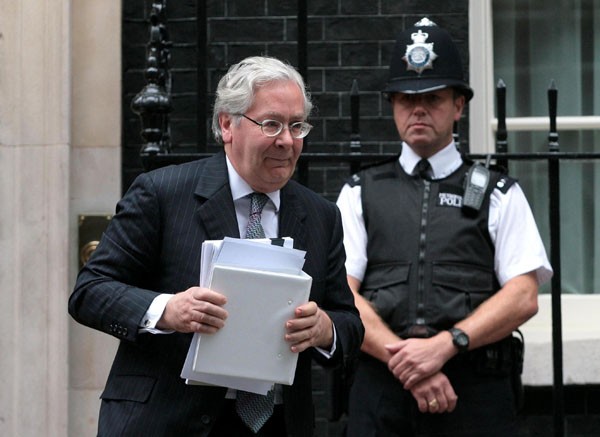
Mervyn King. Photo: Katie Collins / PA Photos / TASS
In the early 1990s, during the formation of state institutions in Russia, which no one dares to call “new”, it was actively said that, according to all international standards, the main bank of the country should be as independent as possible from the head of state, parliament and even the government. They say that it is more useful for the monetary system - it seems like the Central Bank stands guard over people's money from greedy politicians who are ready to spend every last penny to please the promises given to voters. In addition, the Bank of Russia has to fight inflation - this is one of its main purposes. So what is the dependency? This is how it is written in all legislation. Now we are no worse than our neighbors. Yes, and the head of the Central Bank periodically speaks in parliament and visits the president. But all claims or proposals not only of deputies, but also of ministers are ignored - and this is with all the chairmen of the Central Bank, no matter who he or she is. In this sense, the transformation of Ms. Nabiullina turned out to be especially interesting.
What are the main claims against Elvira Nabiullina? Expert magazine calculated that there are three of them:
1) excessive strengthening of the ruble exchange rate;
2) artificial preservation of expensive credit;
3) lack of money in the economy.
And he drew a fascinating parallel between the words of Elvira Sapkhizadovna when she was the Minister of Economy and the deeds of the chairman of the Central Bank. As they say in Odessa, these are two big differences. She once said: “Now a bank that issues a long-term loan sharply increases the risk of its stability. The economy needs long-term loans, and banks can only rely on short-term liabilities. In such a situation, the implementation of large projects in the economy is virtually impossible.” But when she became the head of the Central Bank, the impossible became quite possible. And it is precisely the policy opposite to those old statements of Minister Nabiullina that the BIS is now pursuing.
“National reserves owned by central banks are public money, the property of countries,” Adam Lebor expresses one of the main thoughts. - The discussions of the leading bankers in the BIS, the information they share, the economic policies they take, the opinions they exchange, and the subsequent decisions they make are purely political. Central bankers, whose independence is protected by the constitution, control monetary policy in the developed world. They control the amount of money in circulation in national economies. They set interest rates, thereby determining the value of our savings and investments. They decide whether to focus on austerity or growth. Their decisions shape our lives. The BIS's tradition of secrecy has been maintained for decades." And the BIS has something to hide, and it does it carefully.
The most shameful page is active cooperation with Hitler. “The main place in the financial relations of fascist Germany with many countries of the world was occupied by the Bank for International Settlements (BIS) in Basel,” writes Igor Mikhailov in Literaturnaya Gazeta. - When Hitler began to realize his plans and carried out the Anschluss of Austria in 1938, the gold of this country immediately ended up in the safes of the BIS. After the occupation of Czechoslovakia, the gold reserves also had to be there, but by agreement with Great Britain (!) Was during the war in an English bank. According to the logic of financial magnates, the war is not a hindrance to the banking business. Gold from the Nazi concentration camps, melted down into gold bars, settled in the German safes of the BIS. This bank successfully operates in Basel to this day. It was he who served as a kind of model for the creation of the International Monetary Fund in 1944. BIS staff members from Germany, Great Britain and the USA got along well with each other during the war - after all, it was somewhere out there, they killed some other people, but not the elite of the financial world. These facts are well known, but now they are very successfully hushed up.
“But we don’t have any sensible publications on the BIS, the BIS mass media also don’t favor it,” states Valentin Katasonov. - By the way, last year, when the 70th anniversary of the Bretton Woods Conference was celebrated, I recalled that a resolution was adopted to eliminate the BIS as an active accomplice of the Third Reich, but this decision was not implemented. So the Basel Bank continues to exist. In general, I think that in terms of influence it outweighs the International Monetary Fund. Especially in the current situation, when the IMF is going through a serious crisis. And the IMF coordinates all key issues with the BIS.” Still not to coordinate, and moreover, in such wonderful conditions.
“Central bankers are more at ease and at ease with their fellow bankers than with their own governments,” Adam Lebor recalls Paul Volcker, the former chairman of the US Federal Reserve, visiting the Basel weekend. The excellent quality of food and wine provided a camaraderie, said Péter Akos Bod, former governor of the Hungarian National Bank: “The main topics of discussion were the quality of the wine and the stupidity of the finance ministers. If you don't know wine, you can't join the conversation." And the conversation is usually stimulating and enjoyable, central bankers say.
All chairs attending the two-day meeting are guaranteed the utmost confidentiality, secrecy and the highest levels of security. Meetings take place on several floors, which are usually used only when managers are present. Managers are provided with a dedicated office, the necessary support staff and a secretariat. The Swiss authorities have no jurisdiction over the headquarters of the BIS. Established by international agreement and henceforth protected by the 1987 Headquarters Agreement with the Swiss government, the BIS enjoys the same privileges as were accorded to the headquarters of the United Nations and the International Monetary Fund (IMF), as well as diplomatic missions. The Swiss authorities need permission from the BIS management to enter the bank's buildings, which have the status of inviolability. The BIS has the right to transmit encrypted messages, as well as send and receive correspondence in bags that are under the same protection as diplomatic bags, that is, they cannot be opened. The BIS is exempt from Swiss taxes, its assets are protected from civil suits under Swiss law and can never be confiscated. The BIS strictly guards banking secrecy, confesses Adam Lebor. The bank does not like to shine at all.
“If you look at the statistics of publications, then there are two or three orders of magnitude less publications for the BIS than for the IMF. A completely non-public organization. About like Bilderbergs, ”says Valentin Katasonov.
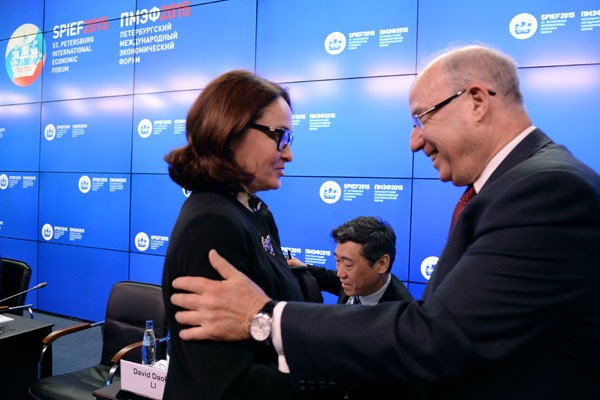
Chairman of the Central Bank of the Russian Federation Elvira Nabiullina and Chairman J.P. Morgan Chase International Jacob Frenkel. Photo: Ilya Pitalev / RIA Novosti
Many are interested and have some understanding of the global economy and the financial crisis. And only a few of them have heard of the BIS. It was strange, says Adam Lebor, because the BIS is the most important bank in the world and predates both the IMF and the World Bank. For decades, it has been at the center of a global web of finance, power, and hidden global influence. The BIS was founded in 1930. For appearances, it was created as part of Young's plan to manage German reparation payments for the First World War.
Key figures in the creation of the bank were Montagu Norman, governor of the Bank of England, and Hjalmar Schacht, president of the Reichsbank, who called the BIS "his" bank. The founding members of the BIS were the central banks of Britain, France, Germany, Italy, Belgium and a consortium of Japanese banks. Shares were also offered to the Federal Reserve, but the United States, suspicious of anything that might infringe on its national sovereignty, declined the offering. Instead, the shares were purchased by a consortium of commercial banks: J.P. Morgan, First National Bank of New York, and First National Bank of Chicago. The true purpose of the BIS was written in its charter: "to promote cooperation among central banks and to provide additional favorable conditions for international financial transactions." It was the culmination of a long-term dream of big bankers: to have their own bank - powerful, independent and free from the interference of politicians and overly curious journalists.
“It seems that central bankers are now more powerful than politicians,” writes The Economist, “and the fate of the world economy is in their hands.” How did it happen? Much of the responsibility for this can be placed on the BIS, the world's most secret financial institution. From the first day of its existence, the BIS has devoted its activities to promoting the interests of central banks and building a new architecture for transnational finance. In doing so, he has spawned a new class of tightly knit global technocrats, whose staff fluctuate between high-paying positions at the BIS, the IMF, and central and commercial banks.”
“Since the Central Bank is not part of the Russian financial system, it is part of another system - the one where the BIS is the main one. That is why it turns out to be central for Russia as well,” concludes Maxim Kalashnikov, member of the Fed Council of the Delo party.

